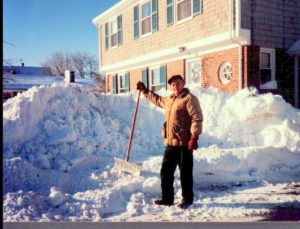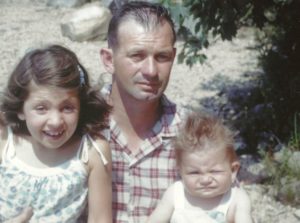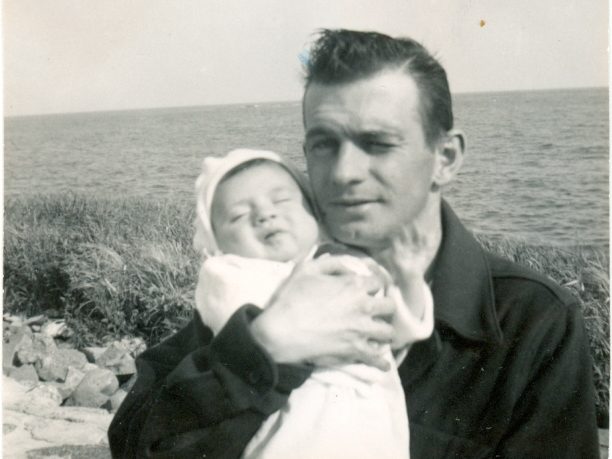Culturally we’ve been pondering the question: What is a woman? Maybe it’s time to ask: What is a man?
My father — a bricklayer with eight kids — saw the world as a place of mystery and beauty, but that things could go so consistently, abysmally, wrong gnawed at him.
“Doesn’t that get my goat!” he’d rail in the parking lots of grocery stores, spotting a cart left by a careless shopper. “If that thing ever got rolling, it could pick up momentum, barrel right into a 3- or 4-year-old kid…” He shook his head, leaving us to imagine the twitching limbs, the tiny skull bleeding onto the asphalt.
What he was really thinking, I knew, was that the kid would have to be brought to the doctor — and doctors cost money.
We had supper together every night. Around the dining room table we bonded, and made fun of one another, and endlessly bickered. Dad meanwhile totted up imaginary figures in the air, calculating the cost of a replacement window for the one we’d broken playing baseball (again), new winter jackets for the boys, piano lessons.

Milk in those days was delivered by Mr. Gilman of Runnymede Farms, and came in glass bottles. One night, we were eating supper and, as happened frequently, drained the gallon.
“I’ll get some more,” my younger brother Ross offered, and made for the kitchen. Right away, dad started in. “Don’t drop the milk.” “For Crimey’s sake, don’t drop the milk, it’s up to a dollar-thirty. Whatever you do, don’t drop the milk.”
Almost inevitably, just as Ross was about to reach the table, he dropped the milk. Glass shattered. Milk splashed, ran in runnels, and pooled on the floor.
My father wasn’t violent but for a second we stopped breathing and looked instinctively to the head of the table. A stricken, defeated look crossed his face, and then he bent over double and silently buried his head in his hands.
Had dad lost it for good? Had we finally pushed him over the brink? What if he pushed back his chair, put on his brown Carhartt jacket that smelled of White Owl cigars and Old Spice, climbed into his pickup, and left? Who would take us out in the boat to check the banged-up lobster traps? Who would bake bread on weekends, fuss over the tomato plants, and sit out on the breezeway with his buddies drinking Bud on Saturday afternoons and listening to the Red Sox?
Who would go around the house singing “How Great Thou Art” in that crackpot fake tenor? Who would recite Housman’s “A Shropshire Lad” with what sounded suspiciously like a catch in his throat?
Mom couldn’t leave us. But what if daddy, fount of all fun, all jokes, all food, shelter, clothing, security, order, warmth, bolted?
Was he crying? Had we made dad cry?
At last he straightened up. His beat-up hands dropped to his knees. His face, unthinkably, was wet with tears, and so red we thought he might have had a heart attack. He was still trembling. He was gasping. But finally we realized he wasn’t crying. He was laughing.
“Janet, get me a napkin,” he choked out, and moved to high-five Ross. “Don’t spill … HANH HAH … don’t drop … Lindy Gilman’s kids will eat even if we’re in the poorhouse!” … but he was laughing so hard he couldn’t go on.
Suddenly we sprang into action. One of us ran for rags. Someone else started picking out the biggest chunks of glass. Someone, maybe me, passed behind the back of dad’s chair and patted his thinning hair.

But in a way, I am still sitting at that table with my father: head in hands, face hidden, present physically, yet a million miles away.
Sitting with him while he perhaps contemplated the years stretching behind and ahead: of waking in the dark, of driving 40, 60, 90 miles to his job laying bricks, of standing all day in bitter cold or scorching heat, of constant anxiety, constant frustration, constant fatigue.
Sitting with him knowing that when he opened his eyes his family — whose entire purpose, it sometimes must have seemed, was to break his heart — was going to be looking back at him: waiting, bereft, refusing to leave.
Sitting with him while all that was good and kind and decent in him, and all that was fearful and weak and in pain had perhaps met, and clashed, and in some place that was unknown to us, where we could not follow, on some terrible battlefield in which our fates hung in the balance, he had chosen us over himself; had chosen the spark of life that is humor over despair, over death.
In a way, that is who I write to. My father, in that moment before he lifted his head — and stayed.
For weeks, we’d be finding splinters of glass under the sewing table, the desk, the radiators. There would be more anxiety. There would be more imaginary — and several real — catastrophes. But for now, God was in his heaven and all was right with the world. Until the next broken bottle of milk, or window, or leg, or spirit, life could go on.
Because dad had laughed. Daddy — our rock — had laughed.

